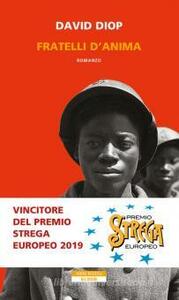Take a photo of a barcode or cover
dark
emotional
medium-paced
Plot or Character Driven:
Character
Strong character development:
Complicated
Loveable characters:
Complicated
Diverse cast of characters:
No
Flaws of characters a main focus:
Complicated
challenging
dark
tense
medium-paced
Plot or Character Driven:
A mix
Strong character development:
Yes
Loveable characters:
No
Diverse cast of characters:
Yes
Flaws of characters a main focus:
Yes
the first part of at night all blood is black had me very intrigued with its stark brutality and description of the madness of war. after a point, the story changes as the protagonist is removed from the front lines. it becomes an exploration of his backstory and his life in senegal, which didn’t go anywhere and took me out of the story. despite being a short story, i gradually became more disengaged and overall didn’t enjoy the book as much as i’d have liked.
✧ full review on my tumblr ✧
✧ full review on my tumblr ✧
Graphic: Gore, Mental illness, Rape, Murder, War, Injury/Injury detail
emotional
reflective
medium-paced
Plot or Character Driven:
Character
Strong character development:
Yes
Loveable characters:
Yes
Diverse cast of characters:
Yes
Flaws of characters a main focus:
Complicated
dark
mysterious
tense
fast-paced
Plot or Character Driven:
Character
Strong character development:
No
Loveable characters:
No
Diverse cast of characters:
No
Flaws of characters a main focus:
Yes
Wow. This book blew me away. I highly recommend!
Graphic: Sexual content, Violence, War
emotional
sad
fast-paced
Unique story about African soldier in WWI from first person perspective
dark
reflective
medium-paced
Plot or Character Driven:
A mix
Strong character development:
Complicated
Loveable characters:
No
Diverse cast of characters:
Yes
Flaws of characters a main focus:
Yes
dark
emotional
sad
tense
medium-paced
Plot or Character Driven:
Character
Strong character development:
Yes
Loveable characters:
No
Diverse cast of characters:
Yes
Flaws of characters a main focus:
Yes
At Night All Blood Is Black is the story of a 20 year old Senegalese man fighting for the French in the Great War. The war was fought between two European powers, but soldiers from the colonies made up a disproportionately large part of the fighting forces and of the casualties. The French created the myth of the "barbaric" African with a gun in one hand and a matchet it in the other to strike terror and claim a psychological edge over the Germans. The French Officers wanted the 'Chocolat' soldiers to act like mad men in battle, but only when commanded. But what happens when a soldier chooses not to play by the rules made by the officers?
The book starts with the narrator blaming himself for not putting his dying "more than brother" friend out of his misery despite him begging him three times to do so. The narrator chose instead to lie down next to him, holding his hands, and once he passed on, he pushed the spilled intestines back into the body, and took the body back to camp to give his friend a dignified burial. The narrator eared a lot of respect (and a medal) for willingly making himself a target and bringing the body back, but by then he had started blaming himself for prolonging his "more than brother's" agony and decided to seek vengence. Every day, he would disappear from the trenches and return with the revolver of a German soldier with the hand attached. Since the French wanted the Germans to believe that the Chocolat soldiers were savages, they were initially very pleased, but after the fourth hand was brought, they started, fearing him. They tried to order him to stop, they tried tricking him into revealing his crime, and when all else failed, sent him back to the base camp for psychological treatment.
In the second part of the book, we hear the backstory of the narrator, of his friendship with his "more than brother" friend, and of how a woman defied her family to express her love for him when she knew he was going away into war. The end, when it comes is unexpected, and open ended. The reader is left to resolve it whichever way they want.
The book affected me very deeply, not because of the graphic descriptions of violence and sex, which were there, but because of the content and the context. The book raises so many questions about colonialism and of how people from the colonies were forced to fight for something they didn't understand. There is the sheer hypocrisy of calling the narrator a barbarian because he sought to kill the enemies in cold blood, yet when a mutinous group of soldiers were finished off in cold blood, that is considered perfectly normal because the orders were given by the white masters.
Throughout the book, war has been described in deeply sexual terms. There are also instances of sexual abuse- white or black, women pay the ultimate price in any war.
The book is translated from French, and the narrative draws on traditional oral storytelling techniques. Words and phases are often repeated for emphasis, and certain words form a leitmotif throughout the book. While I read a physical copy, in my opinion, the book would be more effective as an audiobook. This is not an easy book to read, not just because of the gory descriptions, but also because of the theme. It deals with a chapter of history that we do not talk about much, and is therefore an important book to read.
I read the book as a part of #BlackHistoryMonth. It is also the February BotM for my reading club.
The book starts with the narrator blaming himself for not putting his dying "more than brother" friend out of his misery despite him begging him three times to do so. The narrator chose instead to lie down next to him, holding his hands, and once he passed on, he pushed the spilled intestines back into the body, and took the body back to camp to give his friend a dignified burial. The narrator eared a lot of respect (and a medal) for willingly making himself a target and bringing the body back, but by then he had started blaming himself for prolonging his "more than brother's" agony and decided to seek vengence. Every day, he would disappear from the trenches and return with the revolver of a German soldier with the hand attached. Since the French wanted the Germans to believe that the Chocolat soldiers were savages, they were initially very pleased, but after the fourth hand was brought, they started, fearing him. They tried to order him to stop, they tried tricking him into revealing his crime, and when all else failed, sent him back to the base camp for psychological treatment.
In the second part of the book, we hear the backstory of the narrator, of his friendship with his "more than brother" friend, and of how a woman defied her family to express her love for him when she knew he was going away into war. The end, when it comes is unexpected, and open ended. The reader is left to resolve it whichever way they want.
The book affected me very deeply, not because of the graphic descriptions of violence and sex, which were there, but because of the content and the context. The book raises so many questions about colonialism and of how people from the colonies were forced to fight for something they didn't understand. There is the sheer hypocrisy of calling the narrator a barbarian because he sought to kill the enemies in cold blood, yet when a mutinous group of soldiers were finished off in cold blood, that is considered perfectly normal because the orders were given by the white masters.
Throughout the book, war has been described in deeply sexual terms. There are also instances of sexual abuse- white or black, women pay the ultimate price in any war.
The book is translated from French, and the narrative draws on traditional oral storytelling techniques. Words and phases are often repeated for emphasis, and certain words form a leitmotif throughout the book. While I read a physical copy, in my opinion, the book would be more effective as an audiobook. This is not an easy book to read, not just because of the gory descriptions, but also because of the theme. It deals with a chapter of history that we do not talk about much, and is therefore an important book to read.
I read the book as a part of #BlackHistoryMonth. It is also the February BotM for my reading club.
this was a powerful but disturbing read. set in ww1, we see the mental spiral of a soldier after the death of his friend. quite a short book, but vividly depicts the horrors of war and the exploitation of colonial troops.
dark
mysterious
medium-paced
Plot or Character Driven:
A mix
Strong character development:
Complicated
Loveable characters:
Complicated
Diverse cast of characters:
Yes
Flaws of characters a main focus:
Yes
challenging
dark
emotional
sad
fast-paced
Plot or Character Driven:
Character
Strong character development:
Complicated
Loveable characters:
No
Diverse cast of characters:
Complicated
Flaws of characters a main focus:
Yes




